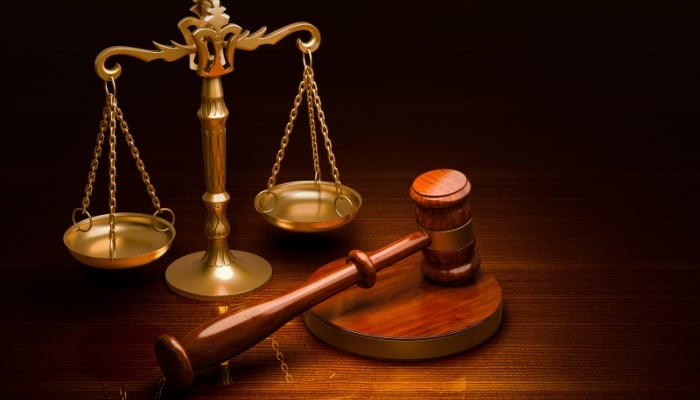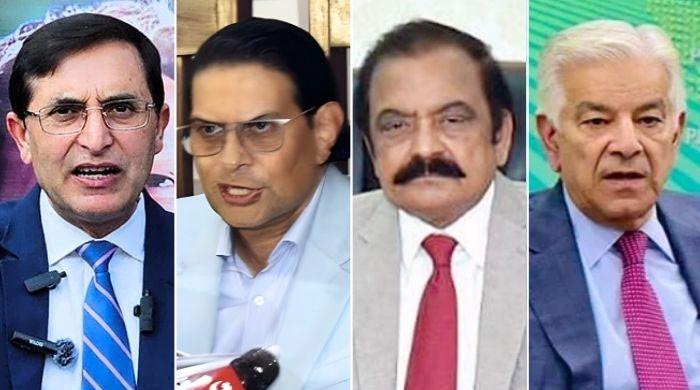Experts weigh in on tweaks to Constitution
"Appointments of judges have been handed back to executive, which [...] should have no business in such selection, says lawyer
October 21, 2024

The coalition government has been hailing the successful passage of the contentious 26th Amendment Bill, 2024, as a major parliamentary achievement.
However, legal and constitutional experts have given conflicting opinions, as some say it is the worst setback for the judiciary in decades, while others believe the reforms will enhance the delivery of justice.
The disputed constitutional amendment bill sailed through the Senate and the National Assembly tonight, despite the opposition from the Pakistan Tehreek-e-Insaf (PTI). The House voted 65-4 to approve the bill with the required two-thirds majority.
Reacting to the late-night development, Pakistan Institute of Legislative Development and Transparency (Pildat) chief Ahmed Bilal Mehboob said that the process of democracy — no matter how weak — has managed to arrange for extensive cross-party consultations and exchange of views despite the reported urgency to pass the amendments.
He said that the consultation process resulted in significant changes made to the judicial package.
However, Mehboob believes there are still provisions, in the amendment bill, that are objectionable, such as allowing the chief election commissioner and members of the election commission to continue in office after their term is completed, and the non-implementation of the key project of establishing a constitutional court.
He said that parliament’s authority has correspondingly increased in judicial appointments and review of performance as the Supreme Court constitutional bench takes away considerable powers from the chief justice of Pakistan (CJP).
"The details of how the CJP and a strong and autonomous constitutional bench will co-exist and what challenges this may throw at the judiciary remains to be seen," Mehboob said.
He further underscored that the process of building consensus has enhanced the political stature of JUI-F chief Maulana Fazlur Rehman and PPP Chairman Bilawal Bhutto Zardari.
While sharing his views on the development, renowned lawyer Barrister Asad Rahim Khan said: “The post-Musharraf consensus is officially over. The 26th Amendment is the biggest reversal for judicial independence in three decades.”
"Appointments of judges have been handed back to the executive, which – as our history is witness – should have no business in such a selection," the lawyer added.
Asad said that the method for handpicking the chief justice of Pakistan, among a list of three, would ensure a "game of thrones" every few years, thus wrecking a system that was until now immune to such intrigue.
The judiciary-oriented constitutional package proposed a set of constitutional amendments, including provisioning a fixed three-year term of the CJP.
A special parliamentary committee — which has the representation of all political parties — has been discussing various proposals, including the establishment of constitutional benches, restructuring of the Supreme Judicial Council, and the formation of a Special Parliamentary Committee that will suggest names from amongst the three most senior judges of the apex court for the CJP's appointment.
He said that judges that were confirmed as future chief justices up until yesterday would likely retire before ever making it, in favour of a court that would naturally prefer pliant or partisan candidates.
“Taken together, the 26th amendment has dealt a body blow to Pakistan’s democracy and its constitutional order.”
Talking to Geo.tv advocate Salaar Khan said: “There will, for instance, be no new parallel court, but there will be a parallel hierarchy within the existing high courts and the Supreme Court with separate presiding judges who do not have to be the chief justice.”
"Whether it is in terms of initial appointment to the courts, or to be made the chief justice, or a presiding judge, or in terms of getting to serve on a constitutional bench, judges will now be beholden to politicians," he added.
Khan said counterbalancing the power and roles of the judiciary, the parliament, and the executive was a delicate task.
“This amendment may be an improvement on the original drafts, but it doesn’t approach that balance with the considered care that it deserves. Of course, it is fairly evident why that is so,” he added.
In his response, Barrister Muhammad Ahmad Pansota clarified that his comment was primarily focused on the legality of the constitutional amendment. He referred to the adopted process as "tainted".
"The amendment should have been floated in the House. The whole purpose of the constitutional amendment is to debate the Constitution. It should take time, though this is not specifically mentioned in Article 238-39, but this is the essence of a constitutional amendment that the houses debate over the whole issue, which is the Senate and then the National Assembly," he stressed.
"Secondly, the spirit of the amendment appears to be contrary to the principle of independence of the judiciary. Also, the seniority principle, which has been laid down in Al-Jehad Trust case," said Barrister Pansota, adding, "It is an attempt to control the master of roster or the very process through which cases are fixed in the SC. Essentially meaning thereby that it impinges upon the independence of the judiciary."
"Apart from that, the whole purpose of the constitutional amendment seems to be controlling or regaining control by the executive. The executive should have control, but it must not surpass the confines mentioned in the Constitution of Pakistan. I believe that it does here in that case," he said.
Hafiz Ehsaan Ahmad Khokhar, a renowned constitutional expert and an advocate, stated that the bill is an attempt to restore the balance between the judiciary and Parliament by passing the 26th constitutional amendment through maximum consensus among different political parties, which included provisions relating to the country's superior courts in a number of areas.
"This was done in order to address the issue of the superior judiciary's exceeding its jurisdiction and its composition of benches through a number of rulings, which has demonstrated over time that the Supreme Court, in particular, had begun to rewrite and read provisions into the constitution that were not within its constitutional authority."
He said that the recently approved revisions by the Parliament do not violate the constitutionally guaranteed principles of the judiciary's independence and the division of powers.
He went on to say that a "fair system" had been put in place for the appointment of chief justices and the elevation of judges to the Supreme Court and high courts, which would ultimately reduce criticism of the judiciary in relation to bench composition, appointment practices, and particularly at the chief justice of Pakistan's office.
Although he acknowledged that the constitutional bench has been approved in these amendments, he said that the Supreme Court and high courts would address constitutional and political matters that would not replace the idea and significance of the concept of the establishment of constitutional court judgment.
He argued that this is the only way forward because the division of constitutional jurisdiction proceeds from the Supreme Court to the high courts, would ultimately minimizing the backlog of cases and expediting the administration of justice for the general public. He finally stated that, in order to improve the lives of citizens, it is now necessary to start legislative reforms through new laws in the criminal, civil, and governance sectors with time bounded way forward.









